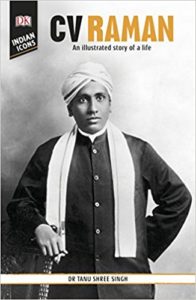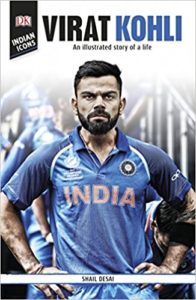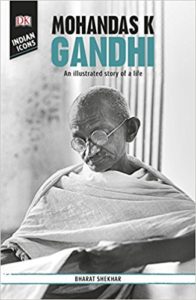C. V. Raman: An illustrated story of a life
 28 February is celebrated as National Science Day in India to commemorate the discovery of scattered lighting or better known as “Raman Effect” named after Nobel laureate and physicist C. V. Raman. He was the first Asian scientist to be awarded the Nobel Prize. He received it in 1930. The scientist wished to explain the phenomenon of sea being blue which tell then had been presumed to be blue as a reflection of the sky. Raman was not convinced especially after observing on a day when the overcast sky was grey but the sea continued to be blue. On 28 February 1928 at the IACS ( Indian Association for the Cultivation of Science) Raman conducted an experiment to prove his theory of modified scattering. According to Dr Tanu Shree Singh who has written a lucid biography of the scientist for children in the DK Indian Icon series:
28 February is celebrated as National Science Day in India to commemorate the discovery of scattered lighting or better known as “Raman Effect” named after Nobel laureate and physicist C. V. Raman. He was the first Asian scientist to be awarded the Nobel Prize. He received it in 1930. The scientist wished to explain the phenomenon of sea being blue which tell then had been presumed to be blue as a reflection of the sky. Raman was not convinced especially after observing on a day when the overcast sky was grey but the sea continued to be blue. On 28 February 1928 at the IACS ( Indian Association for the Cultivation of Science) Raman conducted an experiment to prove his theory of modified scattering. According to Dr Tanu Shree Singh who has written a lucid biography of the scientist for children in the DK Indian Icon series: 
For this experiment, Raman used a pocket spectroscope to examine the scattering of light. It also involved using a blue-violet filter and a piece of uranium glass to render the radiation nearly monochromatic. The experiment led to Raman and Krishnan observing two distinct bands — a strong one, representing the incident light, and a feeble one, correspoding to the scattered light. This was the clinching evidence for what later came to be known as the “Raman Effect”. His discovery explained the change in the wavelength of light that occurs when a light beam is deflected by molecules.
 C.V. Raman’s biography by Dr Tanu Shree Singh is a slim book, packed with information and plenty of illustrations. The DK Indian Icon series has been recently launched by DK India to give in-depth accounts of Indian luminaries. Instead of making these text heavy unlike many of the biographies that are being published today for a young readership are. In spirit with DK India’s strength of being able to access archives to produce richly illustrated, fact filled, and well-researched books, the DK Indian Icon series have been launched as reasonably priced paperbacks without compromising on the quality of paper, ink and binding. The other two inaugural titles are on ‘Father of the Nation’, M. K Gandhi, and superstar cricketer Virat Kohli. These are the kind of books straddling information, good storytelling and inspirational reads that will be read multiple times, consulted and probably scribbled upon by youngsters. Regretfully the narrow margins and lack of blank pages at the end to encourage taking notes limits the use of these books. Be that as it may if the first three titles are the blueprint of the forthcoming titles then DK Indian Icon series is a collection worth building in schools or at home.
C.V. Raman’s biography by Dr Tanu Shree Singh is a slim book, packed with information and plenty of illustrations. The DK Indian Icon series has been recently launched by DK India to give in-depth accounts of Indian luminaries. Instead of making these text heavy unlike many of the biographies that are being published today for a young readership are. In spirit with DK India’s strength of being able to access archives to produce richly illustrated, fact filled, and well-researched books, the DK Indian Icon series have been launched as reasonably priced paperbacks without compromising on the quality of paper, ink and binding. The other two inaugural titles are on ‘Father of the Nation’, M. K Gandhi, and superstar cricketer Virat Kohli. These are the kind of books straddling information, good storytelling and inspirational reads that will be read multiple times, consulted and probably scribbled upon by youngsters. Regretfully the narrow margins and lack of blank pages at the end to encourage taking notes limits the use of these books. Be that as it may if the first three titles are the blueprint of the forthcoming titles then DK Indian Icon series is a collection worth building in schools or at home.
DK Indian Icon Series, DK India, New Delhi, 2018. Pb. Rs 250
28 Feberuary 2018

No Comments